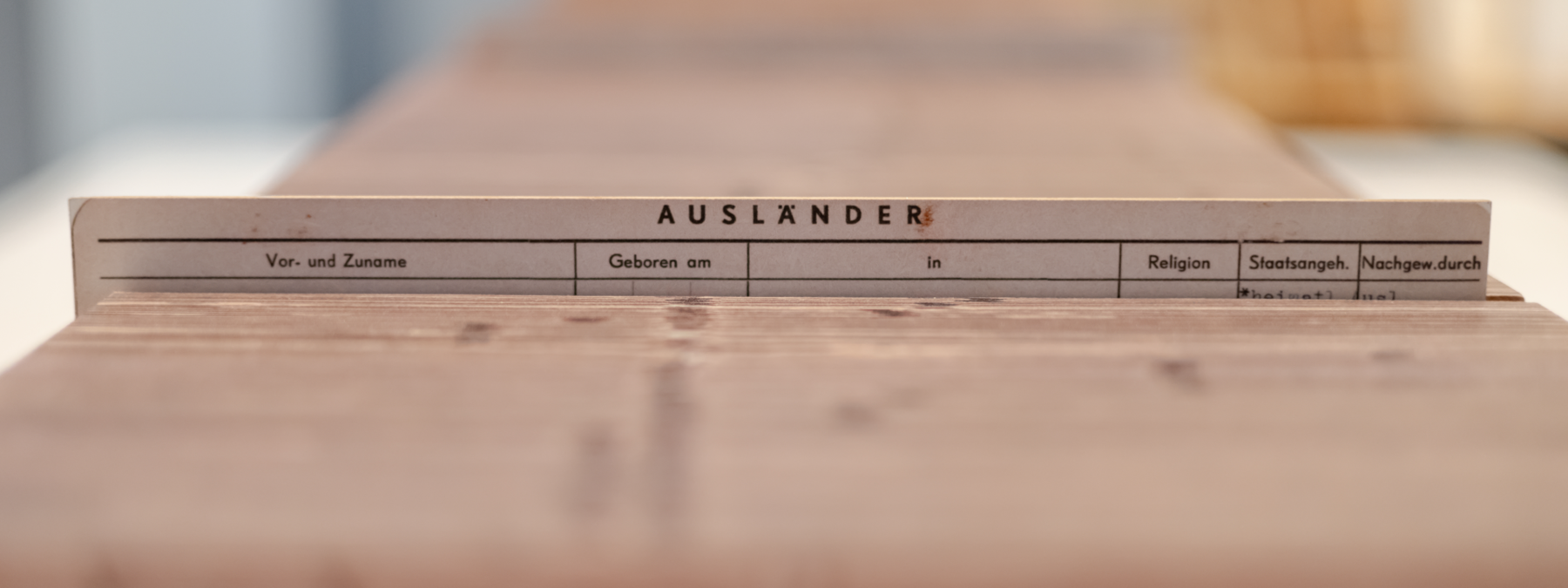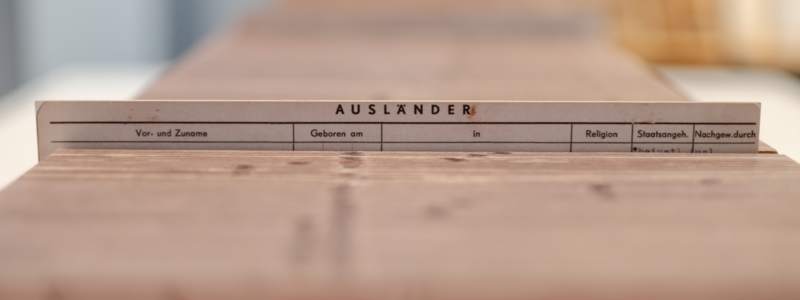

DPs were by no means without resources but brought knowledge, skills, and connections for the benefit of the urban community. They did not only assume different roles in DP camps and in the offices of the occupation authorities but also built up their own businesses to free themselves from their dependence on relief organizations. The trade and business index cards in the Municipal Trade Office from the early post-war period show the diversity of the DPs’ economic survival strategies.
There was no “zero hour” in Munich also. Consequently, Jewish DPs often found themselves confronted by antisemitic structures. After 1933, for example, employees at the Municipal Trade Office had removed all the trade and business index cards of those persecuted because of their Jewish heritage—1745 residents in total—from Munich’s trade and business directory. These index cards, together with the “Directory of Jewish Merchants and Businessmen”, constituted a systematic tool for “Aryanization” and economic annihilation.
In the post-war period, the trade and business index cards of DPs earmarked “Religion: Jewish” continued to be kept in the existing “Trade Index of Jewish Merchants and Businessmen”. It was not until the 1950s that this procedure was changed and the trade and business index cards of business founders of Jewish origin were filed in the general trade directory of the City of Munich.
Abraham Rosner, Watchmaker
Abraham Rosner was born in Jaworzno, Poland, in 1910 where he trained to be a watchmaker. In 1941 he married Lola Neufeld. His entire family was deported to various concentration camps. His parents Isaak and Anna Rosner were murdered. His wife was deported from Sosnowiec Ghetto to Auschwitz extermination camp.
Rosner came to Munich after his liberation from Dachau concentration camp. By December 1945 he had already submitted an application to the Municipal Trade Office to open a watchmaking business which was approved in March 1946. In 1949 he had a certificate of good conduct issued that was valid only for emigration purposes. However, he then decided against emigration and, in 1952, married Irena Badura, who converted to Judaism. From the 1950s onward he was Gabbai at the prayer room in Schulstrasse. This was in an apartment where former DPs met for prayers services. Rosner continued to run his watchmaking business, later on Rindermarkt, until his death in 1982.
Jakob Nowotny, Knitwear
Jakob Nowotny, born 1912 as Jakub Ber Nowotny in Łódź, had a knitwear factory there employing a dozen staff. Forced into Łódź Ghetto, he worked from 1940 in the knitwear section making gloves and socks. He was deported to Auschwitz in 1944, where his wife, Estera, and their child were murdered.
After liberation, he went through the DP camp Feldafing to the DP camp Föhrenwald in 1951 and later to Munich. In Föhrenwald he started manufacturing machine-made knitwear once again.
Garfinkiel Bros. Printing Company
Wolf Garfinkiel was born in 1911 in Tomaszów Mazowiecki (Poland). He and his brothers, Pinchas and Melech, trained to be typesetters. His eldest brother, Josef, was a bookbinder and owned a large printing company in Tomaszów, in which the younger brothers worked.
All members of the Garfinkiel family were deported to different concentration camps. The parents were murdered. The brothers survived and met up again after being liberated. Before emigrating, their paths led them to Munich, where they provisionally ran a printshop to provide Yiddish-speaking members of the DP community with information in the form of a Yiddish newspaper, as well as through other means.
Collection of the Garfinkiel Bros. printing company
Apart from the Yiddish paper, the Garfinkiel Bros., as one of the first Jewish print-shops in the post-war era, also printed greetings cards for festivals such as Rosh Hashanah (New Year), Bar Mitzvah or Bat Mitzvah cards, wedding invitations, and many other things. A copy of every card printed was kept as a sample in the Garfinkiel Bros. archive.
Over the years, many new print formats were added. Apart from their long-standing customers, the printshop also carried out work for the Israelitische Kultusgemeinde München und Oberbayern, and many other Jewish organizations.
Wolf Garfinkiel managed the Garfinkiel Bros. book printing company in Häberlstrasse until 1980, before moving to Corneliusstrasse, where he continued to run the printshop on a smaller scale until 1986. After his death, his widow, Herta, and their daughter, Eva, who had learned the type-setter’s trade from her father, continued his work.





